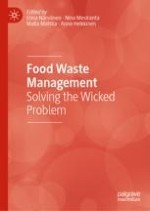2020 | OriginalPaper | Chapter
7. Between Kitchen Sink and City Sewer: A Socio-Ecological Approach to Food Waste in Environmental Design
Authors : Ellen Burke, N. Claire Napawan
Published in: Food Waste Management
Publisher: Springer International Publishing
Activate our intelligent search to find suitable subject content or patents.
Select sections of text to find matching patents with Artificial Intelligence. powered by
Select sections of text to find additional relevant content using AI-assisted search. powered by
